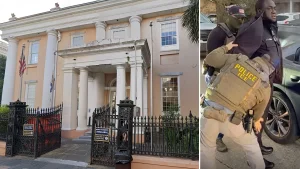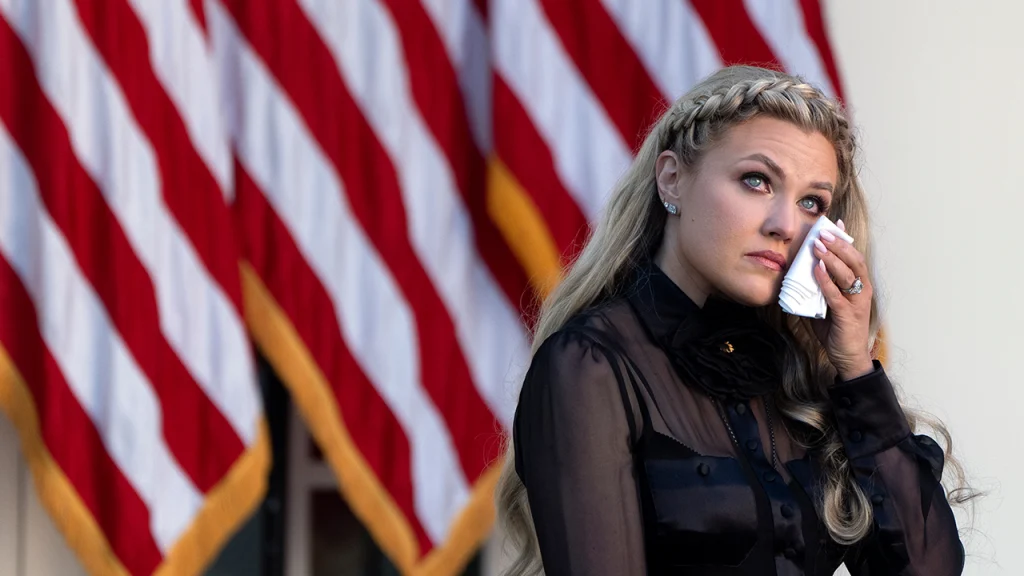A Rose Garden Ceremony Honoring Conservative Activist Charlie Kirk
In a solemn yet celebratory atmosphere, the White House Rose Garden played host to a Medal of Freedom ceremony honoring the late conservative activist Charlie Kirk on Tuesday, October 14, 2025. The prestigious event brought together key figures from the administration and conservative circles to commemorate Kirk’s contributions to American political discourse and activism. As the ceremony concluded, White House deputy chief of staff for policy and U.S. homeland security advisor Stephen Miller engaged in conversation with House Majority Leader Steve Scalise and Katie Miller, former Communications Director for the Vice President. Their informal discussion at the edge of the Rose Garden highlighted the personal connections and professional relationships that underpin Washington’s political landscape, a reminder of the human dimension that exists beyond partisan politics.
The Medal of Freedom, America’s highest civilian honor, was bestowed posthumously upon Kirk, recognizing his influential role in mobilizing young conservative voices and his founding of Turning Point USA, an organization dedicated to promoting conservative principles among college students. The ceremony itself was marked by emotional tributes that traced Kirk’s journey from a young activist to a significant figure in American conservatism. Family members, colleagues, and political allies gathered under the autumn sky to honor a man whose legacy continues to shape conservative politics and youth outreach. The President’s remarks emphasized Kirk’s dedication to free speech on college campuses and his entrepreneurial spirit in building a movement that resonated with a generation of young Americans seeking alternative political perspectives.
As the formal proceedings concluded, the Rose Garden transitioned from a venue of ceremony to one of connection and reflection. Stephen Miller, known for his influential role in shaping immigration policy and national security matters, appeared deep in conversation with Steve Scalise, whose own journey through politics has been marked by both triumph and personal tragedy following the 2017 congressional baseball shooting that nearly claimed his life. Katie Miller, whose communications expertise had helped shape the previous administration’s messaging, joined their discussion, bringing her unique perspective from having worked closely with the Vice President during pivotal moments in recent American history. Their conversation, though private in content, represented the continuing dialogue among those who had worked alongside Kirk in various capacities during his active years in Washington.
The October ceremony took place against a backdrop of political transition and ongoing national debates about the direction of American conservatism. The Rose Garden itself, with its carefully maintained flora beginning to show signs of seasonal change, provided a fitting metaphor for the evolution of political movements and the passing of torches from one generation of leaders to the next. Attendees noted the symbolic timing of the ceremony, coming just weeks before another national election that would test many of the principles Kirk had championed throughout his career. The posthumous recognition of Kirk’s contributions signaled an acknowledgment of his role in reshaping conservative outreach and messaging strategies, particularly among younger voters who had traditionally been less engaged with right-leaning politics.
Following the ceremony, small groups of attendees lingered in the garden, sharing memories of Kirk and reflecting on his impact on their personal and professional lives. The conversation between Miller, Scalise, and Katie Miller appeared to carry both nostalgic and forward-looking elements, perhaps bridging past accomplishments with future aspirations for the movement Kirk had helped to build. Their body language suggested a comfortable familiarity born of shared experiences in the intense environment of Washington politics, yet also conveyed the seriousness of purpose that continues to drive their respective roles in government and public service. Other notable figures from media, activism, and education circulated through the garden, creating a momentary community united in recognition of Kirk’s legacy despite the various paths that would take them in different directions once they departed the White House grounds.
As the afternoon light began to soften over the Rose Garden, the gathering gradually dispersed, with Miller, Scalise, and Katie Miller among the last to leave the historic space. Their lingering conversation seemed emblematic of the ongoing work of governance and political organization that continues beyond ceremonial moments. The Medal of Freedom ceremony for Charlie Kirk represented not just the recognition of one individual’s contributions to American political life but also the continuity of the movement he helped to shape. As attendees departed through the colonnade, many carried with them challenge coins commemorating the occasion – small tokens that would serve as physical reminders of both Kirk’s legacy and the relationships forged in the pursuit of shared political visions. In this way, even as the Rose Garden emptied and White House staff began the work of transitioning the space back to its everyday function, the impact of the day’s recognition continued to ripple outward through the networks of American political life.














